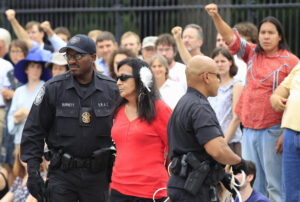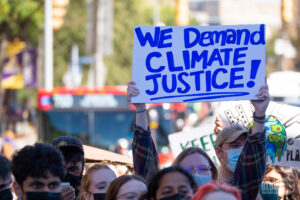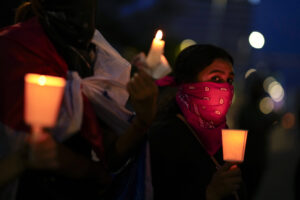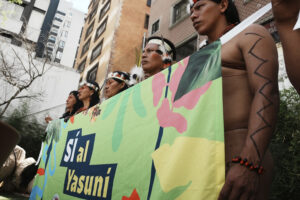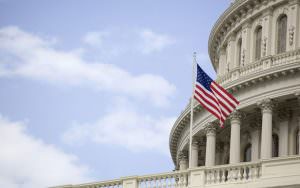VIDEO: COP21 Climate Conference: Climate Justice at the Twilight of the Talks
As Truthdig columnist Sonali Kolhatkar reports from the UN climate negotiations in Paris, she explores the official and unofficial places where climate justice activists gather, and she learns what some had planned for the final day of talksReporting for Truthdig from Paris, Sonali Kolhatkar explores the official and unofficial places where climate justice activists gather among the U climate negotiations and learns what some had planned for the conference's final day.Kolhatkar, a Truthdig columnist, reported from Paris. See more of her COP21 coverage here.
Near the Eiffel Tower on Dec. 10, International Human Rights Day, Eros San — a prominent French climate justice activist — addressed a crowd of people who describe themselves as representatives of “front-line communities” in the fight against climate change. The gathering occurred as representatives from 190 countries hashed out a global treaty to curb greenhouse gas emissions. After his talk, Sana explained to me why he was there and what the activists had planned for the last day of negotiations.
Elsewhere in Paris, dozens of prominent climate justice nonprofit groups organized a large convergence area in a historic space used by artists. In a working-class neighborhood near the River Seine, CentQuatre is hosting a series of daily meetings, workshops, film screenings, talks and civil disobedience training sessions for thousands of people. The space has been dubbed the Zone D’Action Climat, or Climate Action Zone, and coincides with the second week of the COP21 meeting.
Next door to the COP21 meeting, the United Nations and the French government designated a space for use by members of civil society. The area is called the Espaces Generations Climat, or Climate Generation Space. It is unofficially referred to as “the Green Zone.” This is opposed to “the blue zone,” where the official COP21 talks are held. The space is open to those who were unable to get accreditation to the conference. Like the Climate Action Zone, it hosts a number of booths representing climate justice organizations, but is also dominated by corporate and technological companies proffering their solutions to climate change. Unlike the Climate Action Zone, the Climate Generation Space is a tightly controlled area where activists are allowed to have discussions as long as they do not disrupt the talks. Once in a while, however, activists do break the rules.
Your support matters…Independent journalism is under threat and overshadowed by heavily funded mainstream media.
You can help level the playing field. Become a member.
Your tax-deductible contribution keeps us digging beneath the headlines to give you thought-provoking, investigative reporting and analysis that unearths what's really happening- without compromise.
Give today to support our courageous, independent journalists.
